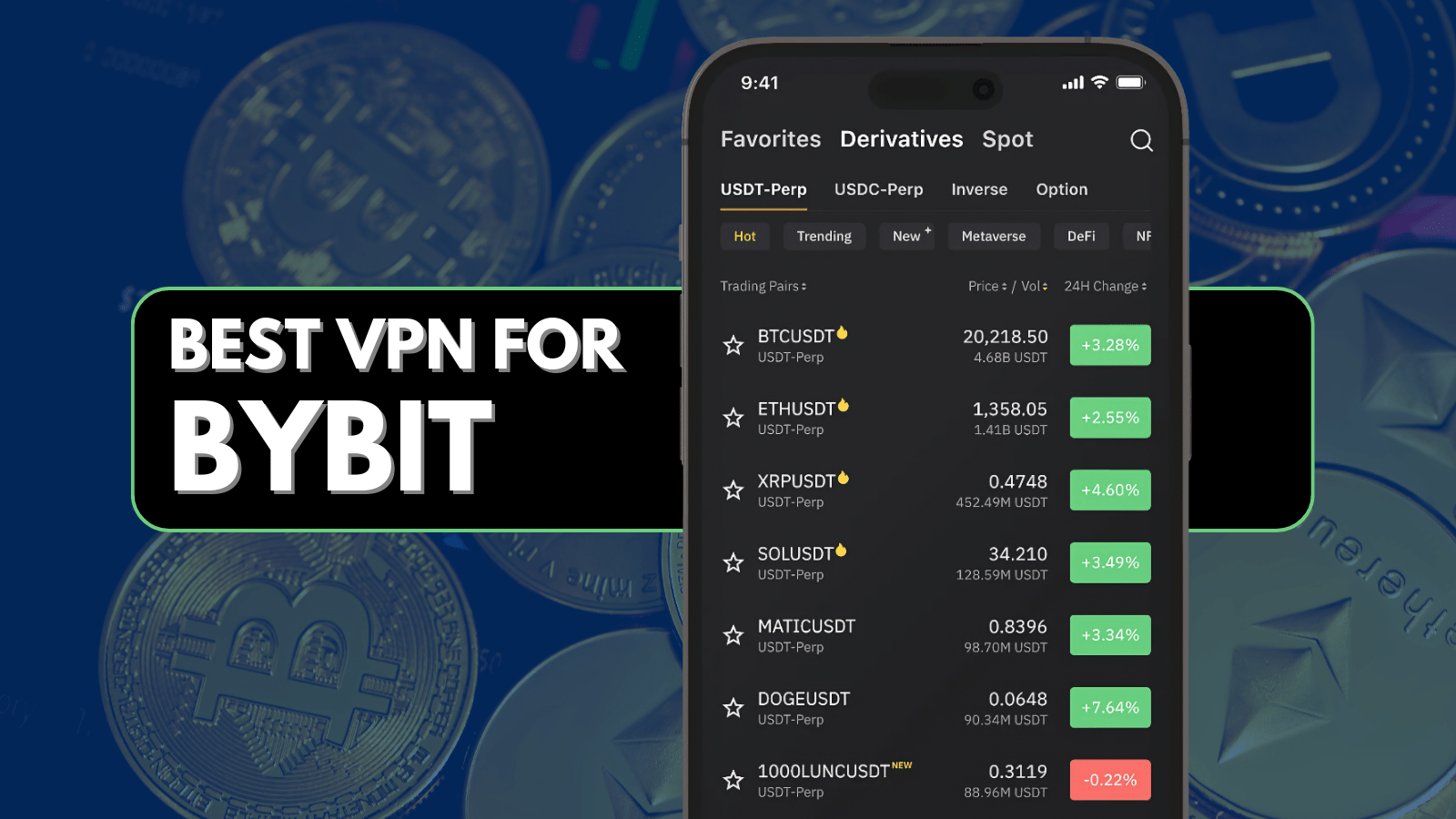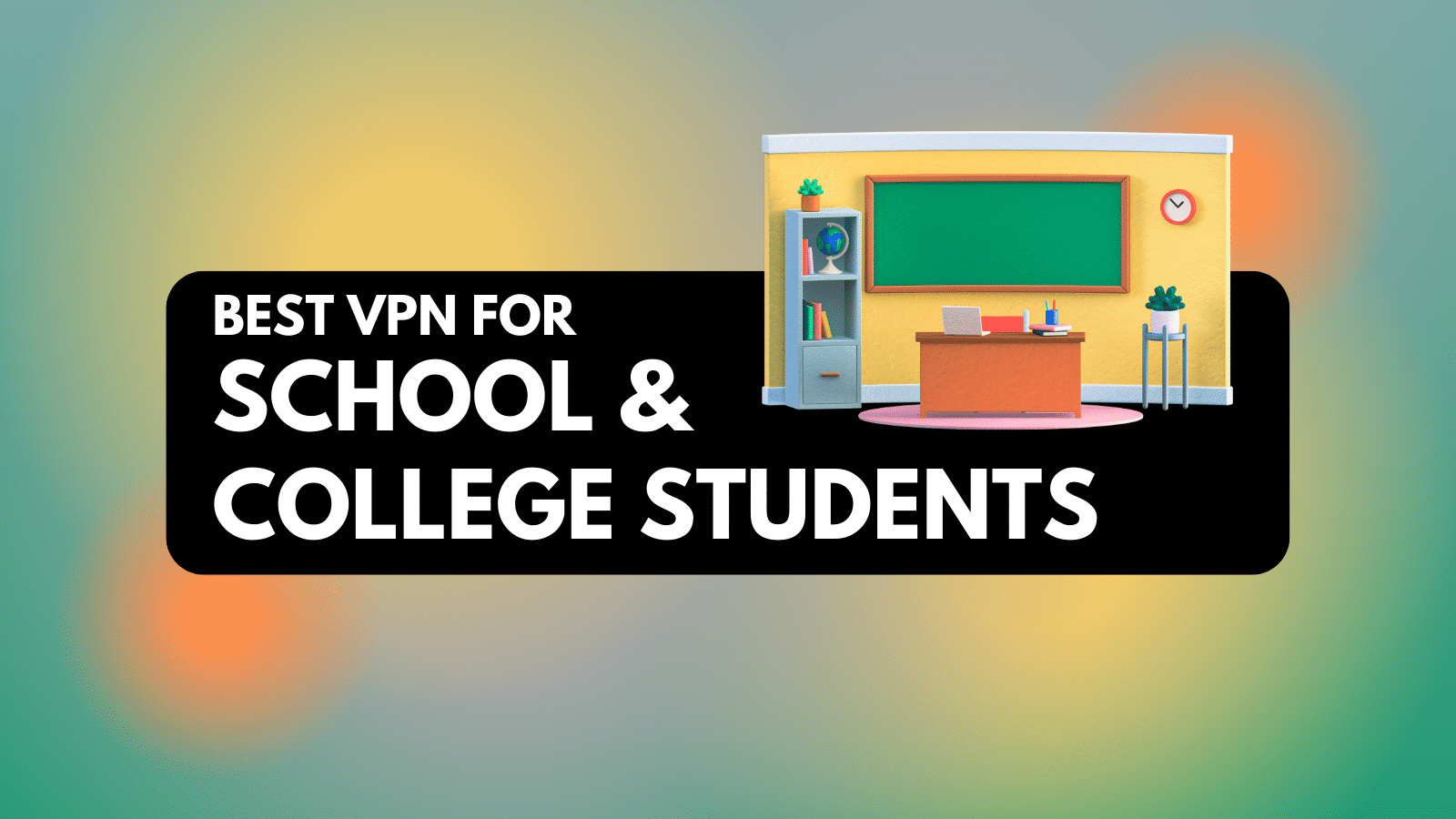When you purchase through links on our site, we may earn an affiliate commission. Here’s how it works.
5 Best VPNs for Smart TV in 2025
Our experts have reviewed 53 VPN providers, which were put through extensive rounds of testing. To learn more about that process, here’s how we review VPNs, where we explain our criteria and our policy of being fully transparent.
While Smart TVs offer a world of entertainment at your fingertips, many popular brands like Samsung, LG, Sony, and Hisense don't directly support VPNs. This limits your access to major streaming services like Netflix, Hulu, Amazon Prime Video, and BBC iPlayer due to regional restrictions on their libraries.
Furthermore, the lack of a VPN can leave your streaming activities and personal information vulnerable to unwanted surveillance. However, you can solve all these issues with the best VPN for Smart TV. By setting your VPN up on your router, using Smart DNS, or sharing the VPN connection over Wi-Fi, you can bypass any geo-restrictions and protect your privacy.
In this article, we will share the 5 best Smart TV VPNs, compare their features, and tell you how to use one to enhance your viewing experience. We’ll also explain why a VPN is crucial for unhampered and secure streaming and how to choose the best provider for your needs.
Best VPNs for Smart TV - Our Shortlist
- ExpressVPN – Our #1-Rated Best VPN for Smart TV in 2025
- NordVPN – Best Smart TV VPN with Industry-Leading Security
- CyberGhost VPN – Provider with Streaming-Optimized Servers
- Private Internet Access – Well-Rounded VPN for Streaming Services
- Surfshark – Simple and Affordable VPN with Unlimited Connections
How to Use a VPN on Smart TV
To use a VPN on Smart TV devices, you'll need to subscribe to a service that supports Smart TVs. Then you can set it up on your TV. Here are easy steps you can follow:
- Sign up for a VPN that works with Smart TVs (we recommend ExpressVPN).
- Download and install the VPN app on your TV.
- Log in to the VPN using your account details.
- Connect to a VPN server of your choice.
- Now, you can enjoy secure, private streaming on your TV.
Since most TVs don’t allow VPNs to be installed directly, you’ll have to configure it manually. For detailed instructions, check out our article explaining how to set up a VPN on Smart TV devices.
The Best VPNs for Smart TV in 2025
To help you find the best VPN for Smart TVs, consult our guide on the best VPN for multiple devices. First, ensure the VPN is compatible with Smart TVs and also supports other devices like computers and smartphones. Prioritize VPNs that permit multiple simultaneous connections for broader coverage and flexibility.
A large server network spread across many countries is also essential. Moreover, look for a no-logs policy, sturdy VPN protocols (like OpenVPN and WireGuard), and AES-256 encryption, which are all indispensable features for privacy and security. You should also ensure the VPN has a kill switch, split tunneling, obfuscation, and ad-blocking capabilities.
If you aim to access geo-restricted content from websites and streaming platforms, select a VPN with robust unblocking capabilities. It’s also important that your VPN provides high speeds and stable connections. Lastly, consider a VPN service with reliable 24/7 customer support and money-back guarantees in case you encounter any issues.
Based on the criteria explained above, these are the 5 best Smart TV VPNs:
1. ExpressVPN – Our #1-Rated Best VPN for Smart TV in 2025
ExpressVPN is the best VPN for Smart TVs because it’s compatible with various kinds of Smart TVs. It’s easy to set up ExpressVPN on Smart TV devices, and it can even be installed directly on Android and Fire OS TVs. Its SmartDNS feature, called MediaStreamer, accommodates TVs that don’t support VPNs at all, and you can also share the VPN over Wi-Fi.
On top of that, you can install ExpressVPN on a router and connect your TV to that Wi-Fi network. This provider supports other devices like computers, smartphones, tablets, gaming consoles, and more—and it permits up to 8 simultaneous connections.
ExpressVPN easily unblocks websites and streaming services like Netflix, Disney+, and Hulu thanks to its 3,000+ servers across 94 countries. Automatic obfuscation also boosts its unblocking capabilities.
ExpressVPN is dedicated to privacy and enforces a strict no-logs policy to keep user data safe. It supports protocols like OpenVPN, Lightway, L2TP, and IKEv2, while using AES-256 encryption for secure online activities. This VPN’s advanced features, like an automatic kill switch and split tunneling, offer a seamless and secure browsing experience.
This VPN’s advanced features, like an automatic kill switch and split tunneling, offer a seamless and secure browsing experience. Moreover, ExpressVPN’s integrated ad blocker also curbs intrusive pop-ups.
ExpressVPN stands out for its blazing-fast speeds and reliable performance, offering 10 Gbps servers that ensure an exceptional user experience. Its commitment to customer satisfaction is evident with its 30-day money-back guarantee and 24/7 customer support for any queries or troubleshooting needs.
PROS
- Works seamlessly on Smart TVs
- Fastest VPN available
- Advanced security protocols
- Unblocks region-locked content
- 30-day money-back guarantee
CONS
- Relatively high subscription cost
2. NordVPN – Best Smart TV VPN with Industry-Leading Security
NordVPN is compatible with many different kinds of Smart TVs. It has native apps for TVs running Android, Fire, and Google operating systems. With its Smart DNS, by setting it up on a router, or by sharing its connection over Wi-Fi, you can connect NordVPN on Smart TV devices that don’t support VPNs.
Plus, it allows up to 6 simultaneous connections for other devices like computers and smartphones. With over 5,800 servers spanning 60 nations, NordVPN’s strong unblocking capabilities provide access to popular streaming platforms, including Netflix, Hulu, and Disney+.
This VPN has a strict no-logs policy and uses security protocols like OpenVPN, IKEv2, and NordLynx. This is all paired with AES-256 encryption for a secure and flexible browsing experience.
NordVPN’s automatic kill switch disconnects your Internet if the VPN connection has any issues. With split tunneling, you can manage what data goes through the VPN. Moreover, its integrated ad blocker means smoother browsing and obfuscation will help you bypass geo-restrictions.
This provider was among the faster VPNs we tested, with server speeds routinely clocking over 150 Mbps. That, combined with its stable performance, makes NordVPN a reliable choice for media streaming. Furthermore, its 30-day money-back policy assures customer satisfaction, and with 24/7 live chat support, technical issues are swiftly resolved.
PROS
- Works with any Smart TV
- Best-in-class security features
- Integrated antivirus support
- Easily bypasses geo-restrictions
- 30-day refund period
CONS
- Limited number of simultaneous connections
3. CyberGhost VPN – Provider with Streaming-Optimized Servers
CyberGhost can seamlessly support Smart TVs. With its native apps, this VPN pairs effortlessly with Android and Fire OS TVs. Its Smart DNS also enables integration with other TVs, or you can share the VPN over Wi-Fi. You also have the option to set up CyberGhost VPN on Smart TV devices by installing it on your router.
This provider allows 7 simultaneous connections and supports different devices like PCs and phones. With over 9,300 servers across 100 countries, CyberGhost has powerful unblocking abilities, allowing access to websites and platforms, including Netflix, Hulu, and Disney+. This comes in very handy for those who want to use a VPN on Smart TV devices.
CyberGhost upholds a strict no-log policy, employs OpenVPN and WireGuard protocols for security, and uses AES-256 military-grade encryption to safeguard against potential breaches.
When it comes to other features, CyberGhost provides a practical kill switch, ensuring your online privacy remains intact even if your connection drops unexpectedly. It also offers the advantage of split tunneling, although it's currently exclusive to Android users, and an integrated ad-blocker, which eliminates intrusive ads.
CyberGhost’s performance is reliable on both local and remote connections, but it’s not as fast as ExpressVPN or NordVPN. Notably, it carries a 45-day money-back policy, providing a risk-free opportunity to try its top-tier services. Their 24/7 live chat support stands ready to help with any inquiries or assistance.
PROS
- Compatible with Smart TVs
- Large number of servers
- Streaming-optimized servers available
- 45-day money-back period
- Round-the-clock customer service
CONS
- Doesn’t offer obfuscation
4. Private Internet Access – Well-Rounded VPN for Streaming Services
Private Internet Access (PIA) can support a wide range of Smart TVs. PIA’s app can be installed on Android TVs. Plus, its Smart DNS function and ability to share VPN over Wi-Fi offer compatibility with most TVs—or you can install it on your router. It also works with devices like computers and phones and allows unlimited simultaneous connections.
PIA easily unblocks access to streaming platforms such as Netflix, Disney+, and Hulu with its network of thousands of servers in 84 countries. Upholding a strict no-logs policy, it ensures user privacy with advanced protocols, including WireGuard, IPsec, and OpenVPN. Moreover, its solid AES-256 encryption also provides robust security and protection.
This provider offers a kill switch and split tunneling for optimized network use. Additionally, PIA VPN incorporates a dedicated ad-blocker called MACE to prevent unwanted content from popping up. You’ll also get obfuscation through its Shadowsocks proxy, which is useful if you want to install a VPN on Smart TV devices and use it to unblock geo-restricted content.
PIA’s speed is, unfortunately, the slowest of the bunch, but it does deliver stable connections on local and remote servers. Plus, the assurance of a 30-day refund period adds to user confidence. Furthermore, PIA VPN's commitment to customer service is evident in its 24/7 live chat support.
PROS
- Supports any Smart TVs
- Largest server network available
- Unlimited simultaneous connections
- Customizable VPN protocols and encryption
- 30-day money-back policy
CONS
- Limited upload and download speeds
5. Surfshark – Simple and Affordable VPN with Unlimited Connections
Surfshark works well with an array of Smart TVs, providing native apps for Android TV and Fire TV. To set up Surfshark VPN on Smart TV, enable its SmartDNS, install it on a router, or share its VPN connection over Wi-Fi. Like PIA, this VPN allows unlimited simultaneous connections and has broad device support for computers, smartphones, and more.
Surfshark’s stellar unblocking abilities allow access to popular platforms like Netflix, Disney+, and Hulu. This is thanks to its 3,200+ servers in 100 countries. It promises user confidentiality with a no-logs policy and employs protocols like WireGuard, IKEv2, and OpenVPN for safe connections. Furthermore, its AES-256 and ChaCha20 encryptions also help it safeguard data.
This provider’s kill-switch functionality and split tunneling feature provide unprecedented control over data privacy and traffic. Surfshark also has a dedicated ad-blocker that eliminates unwanted ads, enhancing your browsing experience. Obfuscated servers are available, too.
Surfshark offers superb speed and consistent performance, ideal for browsing, streaming, and torrenting. Its 30-day refund period provides a risk-free opportunity to assess the service, and the 24/7 live chat support is readily available to help should you need assistance.
PROS
- Smart TVs supported
- Unlimited simultaneous connections
- Comes with ad-blocker
- Unblocks restricted content from anywhere
- 24/7 live chat support
- 30-day refund policy
CONS
- Too simple for advanced users
Best VPNs for Smart TV: Compared
Why Do You Need a VPN for Smart TV?
You need a VPN for Smart TV devices to enhance your privacy, unblock geo-restricted streaming services, and improve your streaming quality. Other reasons you should use a Smart TV VPN include:
- Conceal Your Browsing Activity – A VPN safeguards your streaming and browsing habits from prying eyes, such as ISPs, government entities, and potential hackers. It encrypts your online data, making it unreadable to anyone who might intercept it.
- Hide Your IP Address – VPNs replace your original IP address with one from their server network. This not only hides your location but also makes you virtually untraceable online.
- Bypass Bandwidth Throttling – Some ISPs limit your Internet speed when you consume a lot of data at once, which happens while streaming. A VPN can prevent this throttling by hiding your viewing activities from your ISP.
- Avoid Local Censorship – Certain library titles from popular streaming services might be banned in your area due to censorship. A VPN can help you access them by routing your connection through servers in different locations.
- Access Global Content – Geo-restrictions can limit access to content from other regions. With a VPN, you can virtually relocate your IP address and enjoy diverse international content from any streaming platforms.
- Stream Local Titles When Traveling – If you're traveling abroad, a VPN for TV allows you to access home streaming services and content libraries that might be blocked in your current location.
- Connect Safely to Public Wi-Fi – Public Wi-Fi networks are usually unsecured and open to hackers. A VPN secures your connection, protecting your data even on insecure Internet.
- Avoid Price Discrimination – Some online retailers show different prices based on region. A VPN can help you get the best deals by spoofing your real location.
- Shop Safely Online – A VPN adds an extra layer of security when shopping online, protecting your sensitive information like credit card details. This way you can safely purchase as many movies and TV show downloads as you’d like.
How to Choose the Best Smart TV VPN?
To choose the best smart TV VPN, it’s important to consider several crucial factors, including whether (and how) the VPN supports your TV, how many servers it has, and if it can unblock geo-restricted content. Here’s a full list of features to evaluate in a VPN for Smart TV devices:
- Support for Smart TVs – The VPN you choose should be compatible with many different Smart TVs and ideally have native apps for Android TVs and Fire TVs, which allow VPN installation directly. Besides that, to connect Smart TV to VPN servers, the provider should support router installation, Smart DNS, and sharing its VPN connection over Wi-Fi.
- Support for Other Platforms – Get a VPN on TV that supports other platforms so you can use the same VPN on your Smart TV, computer, smartphone, tablet, and more.
- Simultaneous Connections – A VPN allowing multiple simultaneous connections enables you to connect and protect all your Internet-enabled tech. This benefits households with multiple users or those using several devices at once.
- Server Network Size – A vast server network ensures a greater chance of finding a server that isn't crowded, leading to better speeds. It also allows for more global content access, as you can connect to servers in numerous countries.
- No-Logs Policy – A VPN with a no-logs policy won’t track your online activities. This is essential for maintaining privacy and ensuring your data isn't stored or sold.
- VPN Protocols and Encryption – A quality VPN should use robust protocols (like WireGuard and OpenVPN) and employ strong encryption methods (AES 256-bit). These protect your data from hackers and ensure your online activities remain private.
- Advanced VPN Features – Features like a kill switch and split tunneling enhance security and optimize Internet usage. Plus, ad-blocking provides a cleaner browsing experience and obfuscation helps hide VPN usage to unblock content more easily.
- Content Unblocking Capabilities – A good VPN should bypass geo-restrictions and censorship, allowing you to access any content blocked in your location.
- Performance and Speed – The VPN you choose should offer fast speeds and stable performance to ensure your streaming experience is not compromised by buffering or low video quality.
- Money-Back Policy – A money-back guarantee offers peace of mind. If you're not satisfied with the VPN, you should be able to get a refund.
- Customer Support – Reliable customer service is essential if you encounter any issues or have queries.
Can You Use a Free VPN for Smart TV?
Technically, you can use a free VPNs for Smart TV devices, but it is not recommended for various reasons. Free VPN services often have limitations that can negatively affect your experience. First, they deliver slow speeds due to overcrowded servers, resulting in a frustrating user experience, especially if you plan to stream content on your TV.
Free VPNs also tend to have limited server networks, restricting your options for server locations. This can hinder your ability to bypass geo-restrictions on specific streaming platforms. Simultaneous connections are also limited, preventing you from protecting multiple devices simultaneously.
Security-wise, free VPNs lack strong encryption and advanced features such as kill switch and split tunneling. They could log and sell your private data, undermining the main reason for using a VPN. Moreover, most free VPNs lack TV compatibility entirely.
Considering all these factors, opting for a paid VPN service when using a Smart TV is advisable. They offer better performance, more features, and improved security. Look at our all-inclusive manual for the best VPN services to make choosing a provider easy.
Final Thoughts
Using a Smart TV without a VPN comes with hurdles such as limited access to global content due to geo-restrictions, slower streaming speeds, and exposure to online surveillance. This lack of VPN protection compromises not only the breadth of your viewing experience but also your online privacy and security. The tricky part is finding a VPN that will work with TVs.
We recommend ExpressVPN as the best VPN for Smart TV because it is compatible with many different TVs. It also provides fast, consistent connections and effectively bypasses geographical limitations. Furthermore, this VPN bolsters your Internet safety and guarantees a seamless streaming journey.
That's all for our guide to choosing the best VPN for Smart TV. If you have any questions, let us know via the comments section below. Thanks for reading!






